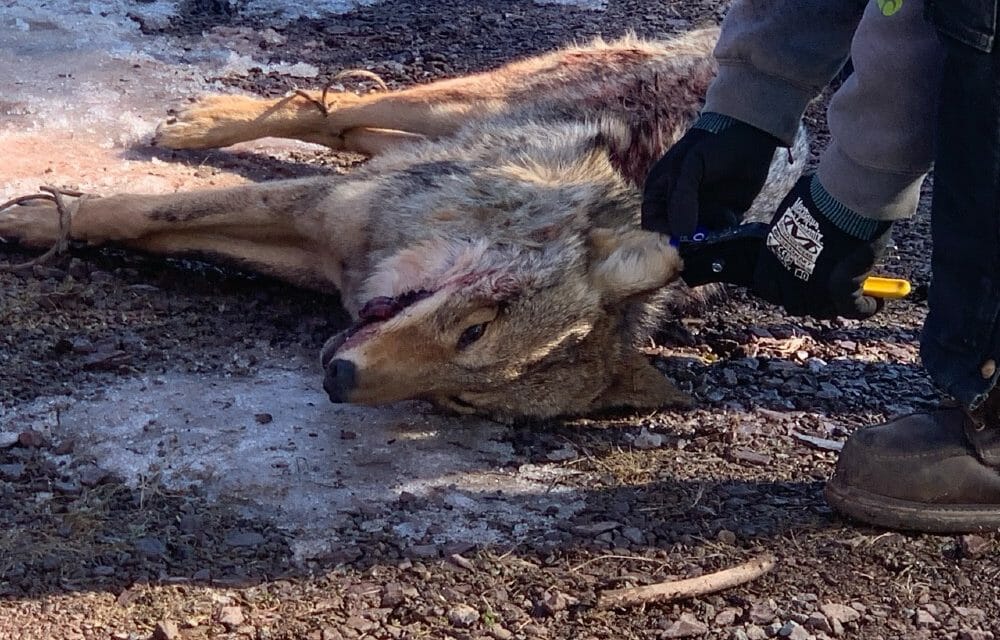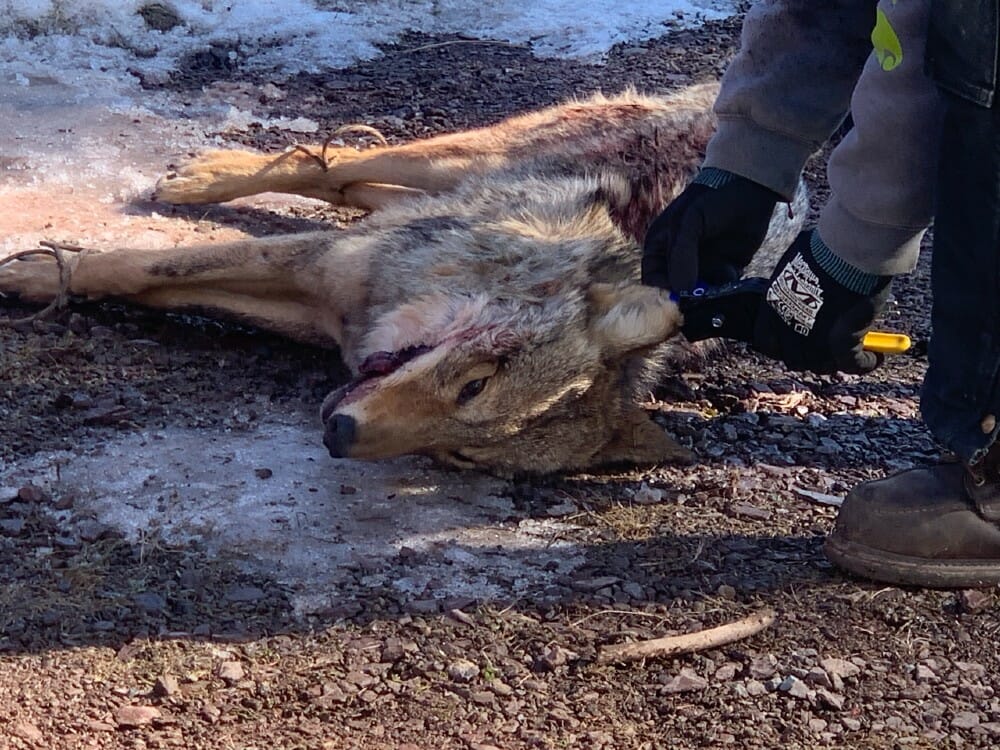Bounty hunters armed with high-tech call devices, dogs, and high-powered firearms lured, chased, and then shot at least 34 coyotes during a recent three-day killing spree incentivized by cash prizes and gun giveaways during the 19th Annual Sullivan County Hunt in Pennsylvania, documented by an undercover investigator for Lady Freethinker.
Female coyotes – who are devoted mothers to young pups who often can’t survive without them – were particularly prized, with the hunt offering a $1,025 award to the hunter who bagged the heaviest female each day.
There also was a $200 prize for the hunter who shot the smallest coyote, and a “grand prize” topping $2,000 for the hunter who killed the heaviest animal. All participants who brought a slaughtered coyote to the weigh-in station at the Laporte Fire Hall also received $50 per corpse, according to the hunt’s Facebook page.
That means the hunt’s organizers paid out at least $6,000 for the mass killing of coyotes who had no documented history of harming anyone.
Per contest rules, participants weren’t confined to a certain area. They could kill the coyotes in any county, regardless of whether there were documented instances of human-coyote conflicts. They were allowed to use call devices, dogs, and night vision equipment, per the Pennsylvania Game Commission’s existing regulations.
Other incentives at this year’s contest included a door prize and raffle for handguns and high powered rifles, including Ruger AR 556s, donated by a local business.
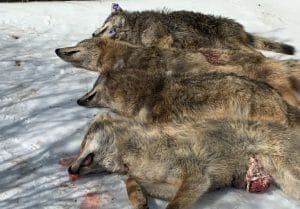
(Photo Credit: Lady Freethinker Investigation)
Participants brought 12 coyotes – whom the hunt’s organizers called “dogs” on the Facebook page – for weigh-ins on the first day. The animals’ lifeless bodies were carried or dragged to the station, where their front and back legs were bound, they were hung from a hook, their weights were called out and recorded and their ears were tagged.
Ten more blood-spattered bodies arrived the second day, drenching the surrounding snow an unsettling pink, as documented in photos taken by LFT’s investigator. Twelve more coyotes ended up on the poster board charts displayed in the firehall on the hunt’s last day.
Participants had used call devices to hunt sixteen coyotes – or 47 percent – while 18 had been hunted with dogs, according to those charts. The majority of coyotes were killed in Wyoming, Susquehanna, and Luzerne counties, but animals were also shot in Lackawanna, Sullivan, Tioga, Bradford, Lycoming, Columbia, and Montour counties.
Twelve gauge and 223s were the calibers of choice used by a majority of the participants, according to the charts.
The hunt’s Facebook page, which was set to “public” prior to publication of this story, made no reference to the myths that Pennsylvania’s wildlife killing contests are “needed” to keep deer available for hunters or to minimize coyote-human conflicts. The page briefly mentions that the event “benefits” the Mildred and Laporte Fire halls, although it doesn’t mention how and organizers declined explaining for this story.
Otherwise, the Facebook page description only capitalizes on the cash.
“The event brings in hunters from all over Pennsylvania for a chance to bag a cash bounty; and one of three top prizes,” organizers wrote in the event’s description.
It was clear to Lady Freethinker’s investigator that at least some of the participants killed with an eye only on those cash prizes.

(Screenshot Sullivan County Coyote Hunt Facebook Page, redactions for privacy)
Comments overheard by LFT’s investigator included participants reportedly saying “Go get the big one,” “This is not the one I wanted, but I just took it down,” and “Not the one I wanted, but it works.”
Another hunter reportedly told organizers he wanted nothing to do with the body and had just killed the animal for the money, while two other participants when asked what they wanted to do with the bodies reportedly said “Just toss it,” and “That’s what dumpsters are for,” according to LFT’s investigator.
The investigator also reported disrespectful treatment of the lifeless animals – including dragging them across the ground by their tails, using their bodies as foot rests, kicking their heads back and forth, and referring to the animals as “fuckers.”
Another hunter was heard saying “I like them dead. They’re better off dead,” while a presenter at the event – who gave tips to those gathered on how to kill more coyotes – was overheard describing the killing as “fun and addicting,” according to LFT’s investigator.

Facebook comment following legislation passed that allows night vision equipment for hunting (Screenshot Sullivan County Coyote Hunt Facebook Page)
Nor was the disrespectful behavior toward the lost lives confined to the adults present. LFT’s investigator noticed two younger individuals playing with a coyote hanging during weigh-ins, with one encouraging the other to “take a picture of his butt.” A child also was overheard saying that he wanted to be like his grandpa by killing large numbers of raccoons and coyotes, according to the investigator.
The Sullivan County Hunt organizers did not respond to a direct message to their Facebook page. Also not returned were two calls to each of the contacts listed by the hunt organizers on their contest flier, and one call each to the Mildred and Laporte Fire Halls, although LFT then received a single text declining comment and saying, “We aren’t interested in doing any interviews at this time. With that said, please stop reaching out to other members of the organization.”
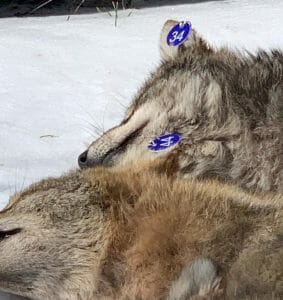
(Photo Credit: Lady Freethinker Investigation)
In the wild, coyotes live in bonded pairs. They take great care of their pups, who often cannot survive without them in their early years. They have complex means of communication and a social hierarchy.
Many Pennsylvania residents acknowledge they have a right to be here.
“Seeing a coyote or hearing the howl of this wild, wily animal is a great reward of nature to many people,” the Pennsylvania Game Commission wrote on its website.
The Commission, which estimates 30,000 coyotes are killed annually statewide by hunters and trappers, also notes that coyotes also evoke other emotions – fear for some, for “just knowing it is in the wild,” to active dislike from some sportsmen who “think predators kill too many game animals” or farmers who “lose livestock,” according to the post.
Regardless of how people feel about coyotes, the data on depredation tells its own story – one in which coyotes aren’t the villains that some make them out to be.
The Commission’s most recent report on coyote complaints showed that people who were “afraid” of coyotes made up 289 of the 494 complaints lodged against the animals in 2020 — or about 59% of complaints. That report also shows that while 167 complaints were made against coyotes involving safety concern for animals — ranging from deer to domestic cows, sheep, chickens, dogs and cats — commission depredation data reports only 90 animals killed statewide in the entire year, with the majority of animals killed identified as “poultry.”
The depredation report notes that coyotes statewide killed only 10 deer in 2020, and a separate report also notes that deer populations are stable or increasing in all areas of the state.
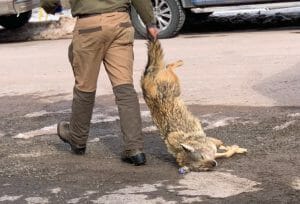
(Photo Credit: Lady Freethinker Investigation)
Predations on deer – by all species of predators in the state, not just coyotes – account for less than 1 percent of deer deaths, according to the Pennsylvania Game Commission.
A study from Pennsylvania State University also has reported that deer populations are stable, with coyotes playing a compensatory role – meaning they don’t add to the deer death rate and the deer they kill would not have survived regardless – and that those who want to see an increase in deer populations would do better to spend money on deer habitat improvements rather than on lethal coyote “control,” according to the study.
Pennsylvania’s livestock also suffered the fewest depredations – by all species – of all states, with less than 2 percent of operations reporting losses, according to the most recent report published by the U.S. Department of Agriculture.
Coyotes also aren’t the only species killed mercilessly in Pennsylvania’s killing contests. Raccoons, foxes, squirrels, bobcats and even crows are among the targets for at least 28 of the state’s killing contests sponsored in January through March this year, with cash prizes ranging from $80 to $2,000.
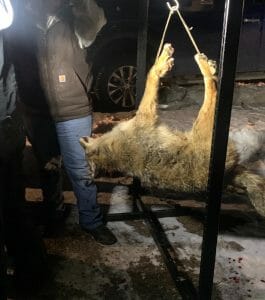
(Photo Credit: Lady Freethinker Investigation)
The Pennsylvania Game Commission told Lady Freethinker via email that they are monitoring the situation but have not yet considered implementing a ban, although they have the authority to place some restrictions on the killing contests.
“Our agency is aware of the situations that are occurring within other states concerning these contests,” the Commission said. “At this time, our board has not considered a proposal to limit these hunts, and our law enforcement staff continue to monitor them for compliance with current law and regulations.”
A growing number of people are recognizing that these killing contests are pointless, unsporting, sadistic, and wasteful, with a poll commissioned by the Humane Society of the United States (HSUS) reporting that 80 percent of Americans surveyed opposed trophy hunting and wildlife killing contests.
“The most important bottom line is that the contests themselves are legal, and they should not be,” HSUS Senior Director Jill Fritz told Lady Freethinker. “It should not be legal to offer cash and prizes for killing.”
More than 900 animals died in just 12 of the wildlife killing contests the HSUS tracked over a single year period, Fritz said.
Kristen Tullo, HSUS’ Pennsylvania State Director and a resident of Pennsylvania, said that for as gruesome as the killing at the 19th Annual Sullivan County Coyote Hunt was, the contest also was one of the smaller killing contests in Pennsylvania. More than 220 coyotes were killed at Mosquito Creek Sportsman’s Annual Coyote Hunt in 2021, the most year for which data is available, Tullo said.
“When it comes to wildlife—whether you live in urban, suburban, or rural areas of the state—Pennsylvanians do not support practices that they view as cruel or wasteful,” Tullo said. “This is simply a matter of ethics, and it addresses irresponsible hunting and the wanton waste of the public’s wildlife.”.
Eight states – Maryland, Colorado, Washington, Arizona, Massachusetts, New Mexico, California, and Vermont – have banned wildlife killing contests. It’s time for Pennsylvania to do the same.
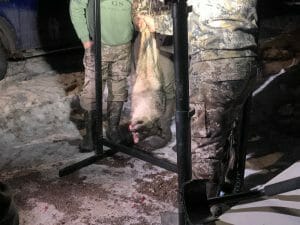
(Lady Freethinker Investigation)
Please speak out against the cruelty by signing our petition urging the Pennsylvania Game Commission to initiate a rulemaking change that would prohibit any person or agency from offering cash, prizes, or otherwise “incentivizing” the indiscriminate killing of innocent wildlife.
We’re also asking the sponsors of this year’s hunt — Custom Autocare in Williamsport, Preferred Portables in Danville, Wert’s Heating and Plumbing in Unityville, North Mountain Sportsmans Club in Muncy Valley, The Barn Tavern in Eagles Mere, Edwards Heating and AC in Collegeville, and P. Dean Homer Funeral Home and Grumpy’s Paradise BBQ, both in Dushore — to find more humane ways to support their local communities.
SIGN: Ban Cruel PA Killing Contests Where Animals Are Gunned Down For Cash

